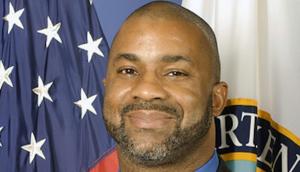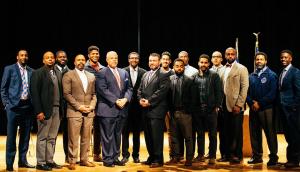A group of local teachers has put together a plan to increase recruitment of black men into the profession.
The Fellowship, a recently founded organization, has already received national attention for its work. Studies have shown that minority students’ performance in the classroom can be enhanced when their teacher is the same race as them. However, according to the organization, having diverse teachers can be beneficial to all students. It can challenge stereotypes that students may have and make them more tolerant.
The group’s motto, “2 percent is not enough,” refers to the fact that just two percent of teachers in America are black men, according to the Department of Education. Only seven percent of total teachers are black, and only eight percent are Latino, compared to 80 percent who are white. Additionally, 3/4 of educators are women nationally. Around five percent of educators are black women, which is also an incredibly small amount. All of this is despite the fact that black students make up nearly 15 percent of the nation’s student body. This means that students everywhere have very little chance of ever having a black man as their teacher.
In Philadelphia, things are better in one way: About four and a half percent of teachers here are black men. However, that figure is highly disproportional to the roughly 26 percent of students in the district who are black males. The group recently released a report called The Black Male Educators Report that outlines these facts in greater detail. It can be read below.
 The Fellowship hopes to recruit 1,000 black men to become educators in Philadelphia public schools by 2020. It’s an ambitious goal, especially considering the perpetual financial woes of the district, but the group has a detailed, multi-faceted plan to achieve it.
The Fellowship hopes to recruit 1,000 black men to become educators in Philadelphia public schools by 2020. It’s an ambitious goal, especially considering the perpetual financial woes of the district, but the group has a detailed, multi-faceted plan to achieve it.
Even though this is the group’s first year as a formal organization, it has already accomplished a lot. The Fellowship held a job fair specifically designed to help black men find teaching jobs. It’s also worked with local colleges and universities to help provide information to people who may be interested in becoming teachers. This past Saturday, the Fellowship hosted David Johns, executive director of the White House Initiative on Educational Excellence for African Americans.
The Fellowship formed out of an informal gathering of black male teachers in the Philadelphia area. Sharif El-Mekki, the founder of the group and principal of Mastery Charter School-Shoemaker Campus, said that he was initially only focused on his own school. Eventually, however, he came to realize that the lack of black male teachers is a national problem.
El-Mekki said that a main goal of the organization is to “plant the seeds early” to grow an interest in teaching, and stressed that early introduction to teaching as a profession is key. Aside from barriers faced due to institutionalized racism, black men who want to become educators face an uphill battle on the path to becoming a teacher.
“There are so many holes in the pipeline to becoming a teacher,” said El-Mekki. It’s not simply that people are graduating college and deciding not to become educators. They have to graduate high school, and have a good enough experience there to want to participate in the education system as a teacher. Aside from that, college is increasingly becoming more expensive, and job opportunities are harder to find. The Fellowship hopes to plug these holes with supplemental and support programs.
In the next few months, the group plans to host five elective courses that high school students interested in teaching can take through Educators Rising, a national nonprofit group focused on recruiting teachers.
The group is also setting up a fellowship program for students. El-Mekki described it as akin to student-teaching, where the student will work under and observe an expert teacher before taking on their own class. Applications for the first year of the program will be up in the fall, and all students, regardless of demography, are able to apply.
El-Mekki said that he hopes more black men will see teaching as a way of fighting for social justice. “The classroom is the most closely connected and most sustainable way for communities to grow … so we’re calling on black men to get in the fight in the classroom,” he said.
Read the Black Male Educators Report.

